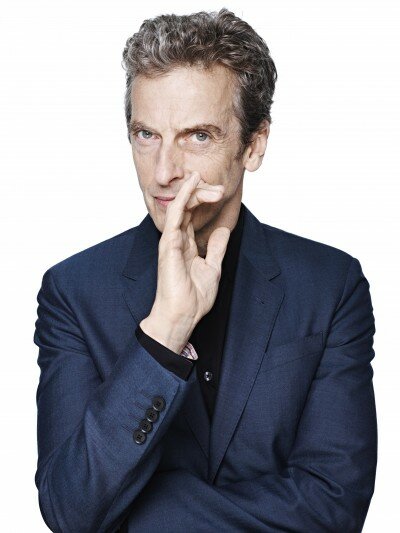

August 16, 2013
50 Glorious Years: Episode 30 - 1992
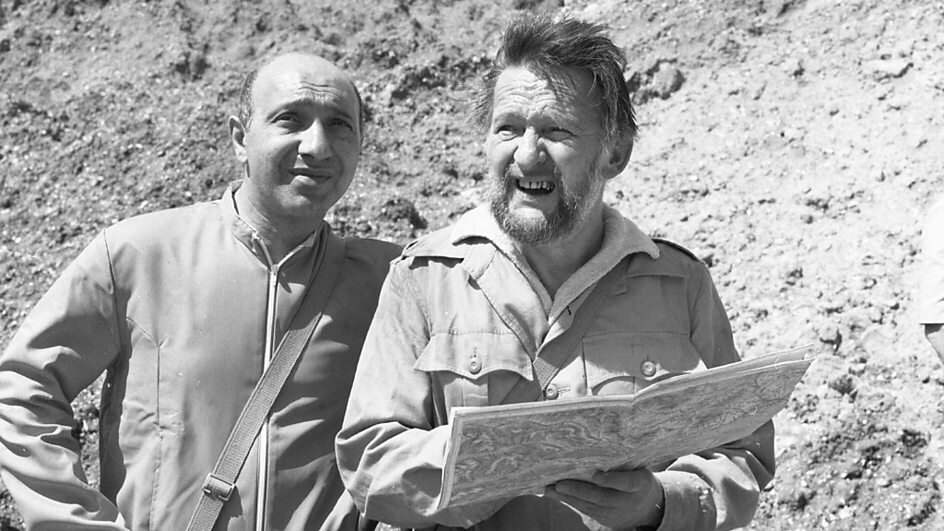
1992 continued Doctor Who fans’ frustrations about the state of the tv series going forward - it was becoming more and more apparent that the show might never come back, at least in the form of new episodes (older ones were being broadcast on BBC2 in the UK as well as a retrospective documentary program, Resistance is Useless). The BBC kept saying that they were looking into independent production, but few believed it by this point. And with the 30th Anniversary soon approaching, the frustration mounted that there would be no new Doctor Who to celebrate the anniversary with. Some fans were so frustrated that they started making their own Doctor Who stories for video - the “Doctor Who-all-but-in-name-only” series The Stranger (which starred Colin Baker in the title role and Nicola Bryant as “Miss Brown”) had started in 1991 and continued in 1992, gaining more popularity with the lack of actual Doctor Who television episodes.
But something happened early in 1992 which was unquestionably the highlight of the year. When things seemed to be getting bleaker and bleaker for fans, a nice present was provided with the shock return of all four episodes of The Tomb of the Cybermen from Hong Kong in January. There had been missing episode finds before and just as large - in fact, the missing episode find prior to this was of the same amount - four episodes of The Ice Warriors found in 1988. But while the previous episode finds had always been celebrated, nothing had been celebrated quite like this. Part of this was to do with the fact that the story was one of the “Holy Grail” stories that fans most wanted to see recovered. Part of this was because it was a complete Patrick Troughton adventure, to add to the paltry total of complete 2nd Doctor Adventures in the archives (which had been just 5 stories up to that point). Part of this was because it was the now the first and only complete story from Season 5. But most of all, I think this missing episode recovery was celebrated more than any other since then because of the timing of when it happened - it gave Doctor Who fans a spark of joy which most had not felt since the show had ceased production. This was the first time missing episodes had been found at a time when they weren’t making new Doctor Who. That, along with all of the other factors, meant that The Tomb of the Cybermen single-handedly made 1992 a glorious year for Doctor Who.
Now imagine how the celebration might be like if they were to find a whole bunch more…..
Posted by Luca on Friday, August 16 at 6:55 pm
(1) Comments
August 12, 2013
Did the CBC really want to redub Christopher Eccleston’s Doctor?
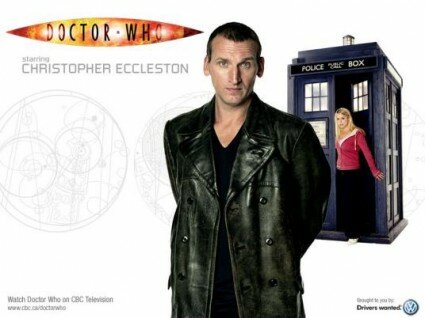
With the upcoming release of The Green Death on DVD, a number of people are taking notice of something Russell T Davies noted on the “Doctor Forever!” DVD feature. Namely, that the CBC wanted to dub Christopher Eccleston’s voice for Canadian audiences. Davies said on the feature “You’re not doing that to our lead actor!”
On the surface it sounds bizarre, CBC is home to Coronation Street a show with lots of Mancunian accents. Why on earth would Doctor Who need to be cleaned up?
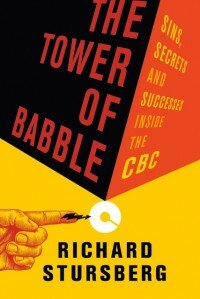 Well, it turns out that a CBC Executive did have that idea. Richard Stursberg was CBC Executive Vice President from 2004 to 2010. Stursberg was to run the English television service. He documented his time with the Corporation in his book Tower of Babble, The: Sins, Secrets and Successes Inside the CBC And in it he writes about what he wanted to do with Doctor Who. :
Well, it turns out that a CBC Executive did have that idea. Richard Stursberg was CBC Executive Vice President from 2004 to 2010. Stursberg was to run the English television service. He documented his time with the Corporation in his book Tower of Babble, The: Sins, Secrets and Successes Inside the CBC And in it he writes about what he wanted to do with Doctor Who. :
The BBC had decided to remake [Doctor Who] and wanted to know if we wanted to buy it. I was doubtful. British shows never do well in Canada. In many cases, the accents are impenetrable, and rather than soldiering on, Canadians simply change the channel. If we were to buy it, we had to find a way to make it more accessible to Canadians.
We met the BBC people at the Spoke Club in Toronto, a hangout for people in the entertainment business. Hilary Read, the head of the BBC in Canada, was there, along with the top person in drama from London and some others.
I would presume that the “top person in drama” was probably either Jane Tranter or Julie Gardner. Both were, I seem to recall, making trips to Toronto to pitch shows to CBC at the time.
As Mike Doran points out to me, the co-production deal was formally announced in October 2004, with the new series four months into production. Stursberg started at the CBC in July 2004. Stursberg hit the ground running if he was actually privy to conversations selling the show, as usually these discussions took place 6-8 months before an announcement.
Stursberg continues:
Over dinner, they explained what the new Doctor Who would be like. We listened politely. After they were done, I suggested they make two versions: one for Britain and one for North America. In the North American version, we would make the Doctor a Canadian and re-voice him with a Canadian accent. That would make the series that much more accessible, since it would involve fewer incomprehensible British accents and a lead character Canadians could feel kinship with.
The plummy woman from London made a strangled noise. “Re-voice the Doctor,” she croaked, “as a Canadian?”
“Yes. Why not?” I replied, “After all, he isn’t even English. He is alien. He has two hearts and three lungs.”
“Re-voice the Doctor, as a Canadian” she gargled again.
“Sure. And it would be seamless. it’s already made in English, so there wouldn’t be any lip-synching problems. We could have the same actor do it.”
“Re-voice the Doctor?” She sounded weak, like she might pass out. “He is an iconic British figure.”
“Why not?” I persisted. “We’ll do it for the Canadian version and if it works here, it’ll be easier to sell in the United States. And, not to be unfair, but you’ve never had a hit in the States.”
The conversation deteriorated. The BBC people politely drew the evening to an early close. We paid the bill and left.
I honestly don’t know if Stursberg seriously pursued this idea within the CBC. Certainly no one at the CBC I talked to in 2005 (mostly people working on promoting the show and its web content, who were communicating with upper echelons) knew anything about it. I frankly wonder if Slawko Klymkiw, the head of the CBC who pushed for the show to come to Canada, even knew of Stursberg’s idea.
I suspect it was just a pitch Stursberg made with Hilary Read and Gardner/Tranter at the Spoke Club but it was taken back to Britain as “Canada wants to re-voice the Doctor”. But who knows, maybe he did try to push the matter further.
There’s so much in Stursberg’s narrative that makes him look like a total idiot… and not just the frankly boneheaded idea of redubbing Christopher Eccleston. These include:
-
The fact that during spring of 2005, Doctor Who was the most popular show on CBC television during the NHL lockout, debuting at over 900,000 viewers, a gigantic number for a non-US drama (it was also treble the ratings of the show previously in the timeslot!)
-
The fact that during the fall of 2006, series two of Doctor Who did far, far better in the ratings without any promotion than many of the domestic CBC dramas Stursberg no doubt championed.
-
The fact that a year or two later, one of the most popular CBC dramas was The Tudors, with you know, impenetrable British accents
-
The fact that Doctor Who actually turned out to be the first breakout hit for BBC America.
Reading Stursberg’s narrative it also becomes quite clear why it was that after Slawko Klymkiw left the CBC (to be replaced by Stursberg’s pal, Kristie Layfield)the CBC had zero interest in Doctor Who and never promoted it and never scheduled it properly. Stursberg was disdainful of the property to begin with.
Thanks to Victor Wong for pointing this out (and reminding me I owned Stursberg’s book but hadn’t read it yet!)Posted by Graeme on Monday, August 12 at 2:27 pm
(8) Comments
August 11, 2013
50 Glorious Years: Episode 29 - 1991
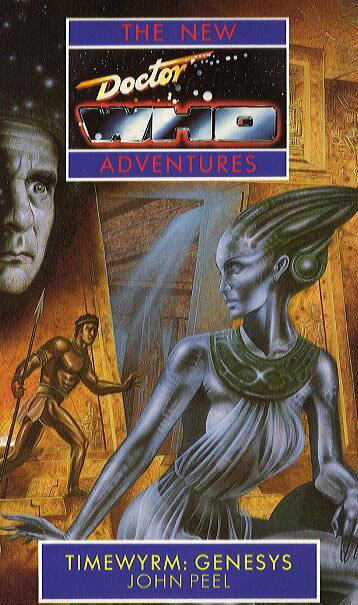
1991 represented a new beginning for Doctor Who - on the printed page, but one which would hugely affect the return of Doctor Who as a regular drama production, first on audio and then once again on television. 1991 was the year the New Adventures started. While they were not every fan’s cup of tea, the effect they would have in Doctor Who fandom and on Doctor Who itself would be huge. First published bi-monthly, the New Adventures would see the likes of Paul Cornell, Mark Gatiss and Gareth Roberts getting their start in professionally writing Doctor Who stories - all three of whom would go on to write numerous stories for the Big Finish audio range and of course for the television series itself and would help launch their careers. Russell T. Davies would also write his first published Doctor Who story for this range (although he got his start in television drama prior to doing so).
Not every fan read them and just like any form of Doctor Who, not every fan who did read them liked them, and they were certainly controversial in their day - but there’s no doubt that the New Adventures were successful and helped to shape Doctor Who as we know it today. For many fans, these books were the “official” continuation of the Doctor Who saga once the television series had been halted and made Doctor Who an on-going concern once again after a brief 1-year hiatus. 1991 would only bring more false promises and delays on television front for fans, who were starting to get very frustrated at not being told by the BBC what was happening (and suspecting that it was because the BBC specificially didn’t want something to happen as far as Doctor Who was concerned). There was some new television Who in 1991 - at least, new Who that you could watch on your television, even if it wasn’t broadcast. In particular, an extended version of The Curse of Fenric, incorporated deleted scenes back into the narrative as the amount of footage that was shot was actually enough for a five-parter (and most fans, even those that liked the story as originally broadcast, agreed that the extra footage was needed to improve the story and help to understand it). It was a bit sad that new Doctor Who for television was now taking this form, but it did help to have the fans cherish what we were getting even more. But overall 1991 belongs, from a Doctor Who perspective, to the start of the New Adventures, which again not only influenced Doctor Who on audio and in television, but also for future new Doctor Who fiction. For other than a couple of “Companions of Doctor Who” books in the mid-80’s, these books were, as hard as it seems to believe nowadays, the first original Doctor Who novels (as opposed to novelizations of tv stories) written, 28 years after the show first began.
Posted by Luca on Sunday, August 11 at 10:21 pm
(1) Comments
August 05, 2013
50 Glorious Years: Episode 28 - 1990
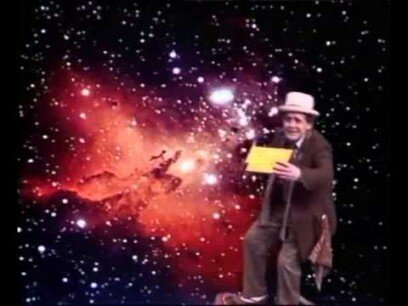
1990 holds a unique spot in the 50 years of Doctor Who‘s history, albeit it is difficult to argue that it is gloriously unique. It was the first year that there were no new episodes made or broadcast since the show was created back in 1963. And unlike every other year since then, it didn’t feature brand new fiction in the form of novels - there were a few Target novels which published in 1990, but the Virgin New Adventure series didn’t start publishing until 1991. The Big Finish audios would not start until 1999. 1990 therefore featured the biggest absence of new Doctor Who in its 50 years to date.
So what did it feature? Well, the Doctor, Ace and K9 did film new scene in-character for a children’s science program called Search out Science (the Doctor Who episode of which was called “Search out Space”). This was the only new “in character” footage for Doctor Who on television this year and the last until the 30th Anniversary specials in 1993. Doctor Who Magazine continued to publish its comic strip in its regular issues, making it the only continuing form of professionally published new fiction for Doctor Who. The more “professional” fanzines like DWB and The Frame also continued. So did regularl club fanzines (such as Enlightenment) though there were fewer of them. Nevertheless the appetite for fans to read and discuss Doctor Who did not diminish with the lack of new episodes - in fact, for many people it increased, with people getting their Who “fix” either from publications like Doctor Who Magazine or from VHS releases of classic stories (well, they were all classic now) - sales of each were brisk. North American fans perhaps felt this “lack of new episode” hunger less quickly than the UK fans, mainly because most fans in North America didn’t see Season 26 until some point in 1990 (or not at all, now that PBS stations had, through no fault of their own, been unable to meet up with the demand for new episodes to show to fans and the exorbitant prices the BBC were still charging, it meant that they started “dropping like flies” (in terms of carrying the series) in the early 90’s.
Pretty depressing, right? Well not quite. At the time many were concerned about the lack of an announcement about the show’s future and the lack of new episodes being made, but the BBC, keen to avoid the public outrcy that had occurred in 1985 when they last tried to cancel the show, never officially announced a cancellation. So many fans were of the belief that it might only be another year or two before the show came back, particularly because we kept hearing seemingly every week that another independent production company led by a former Who writer, producer or script editor had made a bid to the BBC to produce or co-produce the show for them. It was only towards the end of 1990, after over a year of not hearing anything positive come out of any of this, that the fan campaigns started to heat up in earnest to get the BBC to at least make a positive announcement about the show’s future, if not get them to make the show once again.
Behind the scenes, there was a co-production deal invovling Philip Segal that would end up having the greatest impact of all of those bids, but none of the fans knew about that. The fans were, like it or not, getting used to the idea of there being no new Doctor Who on television. What they didn’t know was that 1990 would only be the first of such years - but the positive in all of this is that the fans would start to prove in 1990 that they could retain their interest and keep the show alive without any new episodes, until the time it was ready to come back.
Posted by Luca on Monday, August 5 at 7:42 pm
(0) Comments
August 04, 2013
The New Doctor is…
PETER CAPALDI
Best known by Doctor Who fans for The Fires of Pompeii and Torchwood: Children of Earth but known by British TV fans for his stellar work in The Thick of It, The Hour and a dozen other amazing roles on television were i to have my IMDB on my person.We’ll have more to say in the coming days and weeks, but for now… YES!
Posted by Graeme on Sunday, August 4 at 3:55 pm
(9) Comments
August 02, 2013
Find out the next Doctor LIVE in the UK, US and Canada!
So the announcement that there would be a live broadcast announcing the new Doctor seems to have gone global - even CNN are reporting on it.
And it just keeps getting better. SPACE has just announced that Canada will be also be simulcasting the live special this Sunday at 2 pm. (Eastern time; 7 pm UK time).
People wondering how 50th Anniversary Special would be simulcast given the recent announcements about that... well, see how it’s being done. There will be no commercials either.
Posted by Graeme on Friday, August 2 at 12:32 pm
(1) Comments
July 31, 2013
If the Next Doctor Were American…
a guest post by Carly Ledbetter
There isn’t anything quite like waiting for the announcement of the next Doctor. The closest comparison Americans have is who will be the newest lead on one of our CSIs. We don’t have a cultural phenomenon in our country like Doctor Who is for England. Waiting on bated-breath for the announcement of a new TV show lead is as foreign to us as the accents spoken in Doctor Who.
There are a lot of factors that play into who the next Doctor will be, but the number one stipulation is, obviously, that he be British. After all, this is a British show and it’s not like we hire British actors to play the leads in our weekly dramas (apologies to Hugh Laurie). But what if the Doctor were American? What if the popularity of the show across the pond prompted Steven Moffat to go outside the (blue telephone) box and make the Doctor an American? Who would be the best fit? Let’s first look at the factors that make the Doctor the Doctor.
The Doctor has to have the “good guy” look: No beady rat-eyes, no witch nose and no shifty smile. I know this is a possible point of contention since this pretty much just says “make him good-looking,” but there is more to a good guy look than attraction. He should have a calm demeanor about him. This might be a nice smile, kind eyes, or a soothing voice. Classic doctors gave off a wise, Sherlock Holmes presence. Modern Doctors have embraced the “stylish outsider” look, while still maintaining the look of a good guy.
The Doctor has to be able to rock a fashion item: Speaking of the “stylish outsider look,” the BBC dissected the Doctor’s clothing choices in a manner highlighting the pros and cons to each piece. However, what the American Doctor would need is a fashion item that would stand out as much as his heritage. Bowties and sweater vests have been done, but what hasn’t been done is a headpiece. He shouldn’t don a backwards baseball cap, but a classic derby hat, or maybe a driving cap would pair well with previous Doctor’s fashion choices.
The Doctor needs be someone you would want to follow: More than his companion, the Doctor needs to be able to make an impression on the people (aliens?) he meets in each episode. The doctor must be assertive enough to lead everyone through the perils of time and space, but also approachable enough that his presence doesn’t strike fear in the hearts of the universe.
No Ultra-famous picks: David Tennant and Matt Smith had enough previous acting jobs to merit the title of Doctor, but they were not big-name talents. It would be easy to cast Tom Hanks, Brad Pitt, or Leonardo DiCaprio in the role, as they are well-established actors. However, the idea of them as the next Doctor doesn’t fit with recent choices. No trendy picks either. This means the go-to geek stars are out. No Neil Patrick Harris, no Wil Wheaton and no Jim Parsons. If they are currently a geeky or pop culture star on TV, they are out as well.
Make him the right age: Averaging the last five Doctors ages (27, 34, 41, 36, 44) comes to 36.4. Taking out the astoundingly young Matt Smith (the youngest Doctor ever at 27) and the average is almost 39. Being young doesn’t preclude someone from being the Doctor, but traditionally an age of over 35 is the norm. The doctor is someone that needs to lead. Just as there are few military generals under the age of 40, the Doctor can’t be too young either.
So after debating these topics I have come to my conclusion.
The first American Doctor is:
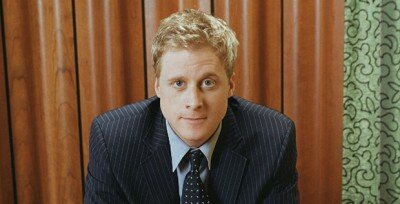
Alan Tudyk!
Alan has some recognizable roles on his resume without being in the “too big” category. At 42 he falls perfectly in range with the average age of Doctors. Reviewing his television and movie work, there is a boyish charm in his actions and smile, giving him the “good guy” look. He would also break another Doctor tradition by being the first Doctor with red hair.
Tudyk is probably best known for his role in the Firefly series. Further enhancing this choice, it shows that he can carry a sci-fi franchise on his shoulders, which any Doctor needs to do. And since Firefly was a Joss Whedon show, it also proves that Alan can handle the wit, comedy and occasional action the Doctor must have.
It would be an interesting twist if the BBC ever decided to have a non-British Doctor. There would be a lot of arguments on both sides, but if Steven Moffat deviated from tradition, Alan Tudyk is the best choice.
Posted by Graeme on Wednesday, July 31 at 1:58 pm
(5) Comments
July 30, 2013
50 Glorious Years: Episode 27 - 1989
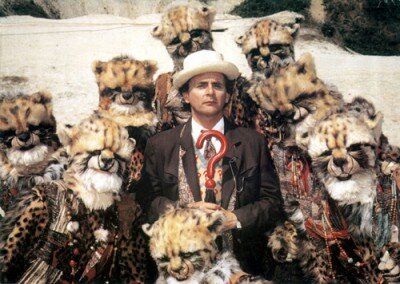
Many fans look back at 1989 with a bittersweet feeling because although it was a good year for the show in terms of its output, it was, for a long time, the last year that Doctor Who was a regularly-made television series and certainly was the last year for the classic series. Yet things weren’t quite so bittersweet at the time. Following on from a very positive end to the 25th Anniversary year of 1988, the first few months of 1989 still felt like the show was in its ascendancy. The broadcast of The Greatest Show in the Galaxy part 4 in the first week of 1989 brought the show past the 6 million mark for just the second time after the hiatus, and at 6.6 million, left Season 25 (and the show in general since the hiatus) on a ratings high. This feel-good story was only added to with the news that the 3rd Doctor, Jon Pertwee, was to resume the role on stage for The Ultimate Adventure. After a few months in the role on stage, Colin Baker took over from Jon Pertwee - another feel-good story as Colin got to play the role again sooner than anyone had expected after his unceremonious sacking by Michael Grade & Jonathan Powell (in fact, at the time nobody was really sure that Colin would ever be able to play the role again, save for a 30th Anniversary “7 Doctors” special if the show continued to run that long of course). For UK fans at least, it meant that there were 3 different actors starring regularly as the Doctor in 1989. Film rumours were heating up this year as production on a film by Coast-to-Coast was promised numerous times, but never materialized - and still haven’t to this day (regardless of what company has had the rights to do it).
As the summer of 1989 wore on, the lack of a confirmation of a Season 27 for 1990 began to loom more and more. Rumours and news began to circulate that there would be no Doctor Who in 1990 - the first year since the show began that there would be no new episodes broadcast. This was confirmed by the end of the summer. As the future storm clouds grew ominously, by September fans were able to enjoy another 14 episode season of the Doctor Who with Sylvester McCoy as the Doctor and Sophie Aldred as Ace. It was a season that would be very influential for the future of Doctor Who, even though (or perhaps, because of the fact) it would turn out to be the last one for some time. Many fans certainly savoured the 26th season, particularly those worried that it would be the last for some time - even longer than the 1 year gap that had been suggested. They would be right - but that doesn’t stop Season 26 helping to make 1989 another good year for Doctor Who.
Posted by Luca on Tuesday, July 30 at 9:55 pm
(1) Comments
July 20, 2013
50 Glorious Years: Episode 26 - 1988
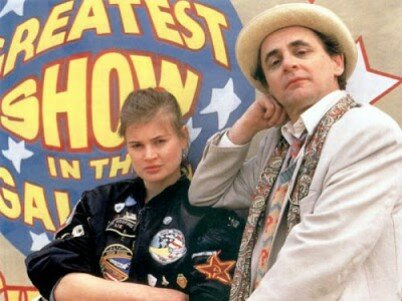
For those of us who were fans at the time, it’s tough to believe that Season 25 and Doctor Who‘s 25th Anniversary was now 25 years ago. In this 50th Anniversary year, 1988 only gets you halfway there.
Although the 25th Anniversary was probably a more low-key affair than the 20th Anniversary (in part because the BBC were now making much less Doctor Who per year than normal, in part because BBC management now wanted to kill the show off, but also in part due to there being no single anniversary special that fandom and the public could focus on), Doctor Who still enjoyed a fine birthday celebration. The show enjoyed a higher profile in the UK than it had since the 1985 hiatus, which partly resulted in the 25th season getting the best ratings of the four post-hiatus seasons (a delayed start in broadcasting to October, rather than September, also likely helped). The show itself, with script-editor Andrew Cartmel & 7th Doctor Sylvester McCoy now much more assured in their respective roles in 2nd runs in the show, is generally considered to have improved upon Season 24 (granted, many would also claim that this isn’t saying much). Popular companion Ace was now also on-board for the full season. After the turbulent events of the previous few years, it did at the time - for one year at least - seem like the show was stable once again and set to run for some time longer. And the improved ratings and reception to the Season 25 episodes created a sense of optimism for the future that was perhaps missing since the BBC had threatened (or tried) to wield its axe in 1985. Usually Anniversaries are all about looking back and while there was some of that (particularly with season opener Remembrance of the Daleks, there was a palpable sense of looking forward to a bright future as 1988 ended.
That bright future was delayed, but we got there in the end.
Posted by Luca on Saturday, July 20 at 11:28 pm
(1) Comments
July 12, 2013
50 Glorious Years: Episode 25 - 1987
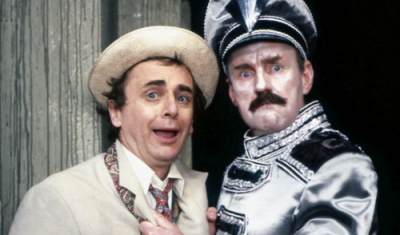
Its 1987 and once again its arguably better to be a Doctor Who fan in North America than in the UK. While there was much division (and in some cases derision) over the debut season of Sylvester McCoy as the Doctor, in North America things were just getting better all the time. After being two years behind on the latest episodes from when they were broadcast in the UK, by March of 1987 when The Trial of a Time Lord was shown in this patch of North America, it meant that we were watching the latest episodes only 6 months behind the UK! You young whippersnappers reading this out there getting your new Doctor Who episodes about 6 hours after the UK broadcast don’t know how good you have it - moving to within a 6 month-lag time behing the UK was considered heaven back in 1987. And the amazing thing is that the broadcast of The Trial of a Time Lord interrupted a run of William Hartnell and Patrick Troughton stories that were being broadcast in the area for the first time (with the exception of a handful of Hartnells that had been shown on the CBC over 20 years earlier that most of us had never seen). From November 1st 1986 through to June of 1987, it was one “brand-new” Doctor Who story every Saturday (except for a two-week break when PBS Buffalo did their annual “Great TV Auction” which suspended almost all programming for the sake of raising funds) showing all of the 1st, 2nd & 6th Doctor stories that existed in the BBC archives at that time.
A lot of fans complain that Season 24 (broadcast in the UK this year) was the worst ever season of Doctor Who. Maybe it was - but who cares! 1987 was a fantastic year to be a fan anyway.
Posted by Luca on Friday, July 12 at 3:06 pm
(2) Comments

The Doctor Who Blog is a collaborative weblog put together by the people at the Doctor Who Information Network that bring you Enlightenment, the most dangerous Doctor Who fanzine in the world.
The Doctor Who Blog's mission is to provide witty and insightful commentary on the world of Doctor Who in all its various forms. And to make several bad puns and references to jokes Tom Baker once made.

To Monthly Archives
Recent Entries
- The Companion Departures - #7 - Susan
- The Companion Departures - #9 and #8 - Ian Chesterton and Barbara Wright
- The Companion Dpeartures - #11 & #10 - Jamie McCrimmon and Zoe Herriott
- The Companion Departures - #12 Steven Taylor
- The Companion Departures - #13 Amy Pond and Rory Williams
- The Companion Departures - #14 Tegan Jovanka
- The Companion Departures - #15 - Sara Kingdom
- The Companion Departures - #16 - Katarina
- The Companion Departures - #17 - Vicki
- The Companion Departures - #18 - Vislor Turlough
- The Companion Departures - #19 Mickey Smith
- The Companion Departures - #20 - Rose Tyler
- The Companion Departures - #21 - Martha Jones
- The Companion Departures - #22 - Captain Jack Harkness
- The Companion Departures - #23 - Harry Sullivan

